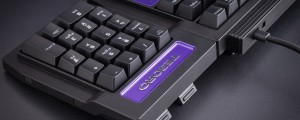The news that Finnish game developer Rovio acquired Futuremark Games Studio hit me like a punch in the gut this morning. As a journalistic outlet we cover all kinds of developers and game news from afar, but our relationship with FGS was a bit more personal than most.
Futuremark Games Studio was an offshoot of Futuremark that came about after years of developing the very well-known benchmark software 3DMark and PCMark. The assets and technology behind all of the sweet 3D demos in 3DMark were ripe for turning into awesome games. Many enthusiasts who would use 3DMark to test their overclock or brag about their new GPU would watch the awesome 3D game scenes play back on their PCs and wonder, “Why isn’t this a real game?”
FGS was based in Espoo, Finland—a large suburb of Helsinki. Jukka Mäkinen headed up the studio for the company, and their first project was a game that looked like it came straight out of 3DMark; a zero-gravity, high-skill twitch FPS called Shattered Horizon. It was uncompromisingly difficult, and it demanded a pretty decent PC to run. It was a blast.
I had the chance to meet Oliver “Ollie” Baltuch around the time Futuremark Games Studio was created and Shattered Horizon was announced. He’s the president of Futuremark Inc., which is the parent company of the game studio, and we went to grab breakfast one morning in Las Vegas in early 2010. We had a great conversation about Futuremark past and Futuremark next, gaming, PC enthusiasts, and more. Over the last couple of years, we developed a good rapport and a friendship that brought us together at other events, such as E3.
Through him, we met other players in the Futuremark family, including James Gallagher, Jukka, and Jani Joki. Not just “met” them in an email and marketing/PR sense, but in the “get on the [FGS] Shattered Horizon server and play the game with us” sense.
Icrontic’s Michael “_k_” Wilson headed up our Shattered Horizon presence and many games were shared between the two groups, with {IC} and [FGS] representing.
Like any friendship that spans more than a business relationship, we watched eagerly as Ollie showed us the early secret Beta builds of Hungribles and Unstoppable Gorg, expressing his gleefulness over a shared iPad on a little bench in Los Angeles.
High five, bro
It’s easy to fall in bro-love with a company like FGS. When you jump into a hardcore PC shooter with guys like this, play with them, win and lose, you know damn well that they’re gamers first and foremost—they speak our language and share our culture.
We followed FGS through all three of their releases, and they always were first in line for us whenever we reached out and asked for things like door prizes for our annual Expo. “Here’s ten keys for SH. Here’s 50 keys for 3D Mark. What else do you need? Here’s T-shirts. Here’s hardware.” That’s the kind of relationship you can build when two underdogs—a little tech site like Icrontic and a little game studio like FGS—meet up and give each other high fives in a sea of much, much larger players. Who was the first site on the entire web to use their new Powermark benchmark in a hardware review? Yep, that was us. Ollie emailed me right away to say “Thanks, man.”
And now, with the Rovio acquisition, it’s more than just Icrontic losing that relationship—it’s what the entire PC gaming culture is losing.
The Disney of Finland
At first glance, it’s such a hard match to understand. Rovio is a global brand with name recognition. Your Aunt knows who the Angry Birds are. Your neighbor’s toddler knows how to play the game. On the other hand, the announcement today will be the first time most of the world has heard of Futuremark. Most news outlets aren’t covering it, because, frankly, your average consumer doesn’t care.
Rovio is going places, fast. Angry Birds was no accidental success. It is a carefully crafted and extremely well-executed brand that is finding its way into the heart of American consumer culture. TV shows, movies, toys–they are taking a page right out of the Walt Disney playbook of 1930, and there’s absolutely no reason to believe they’ll do anything but make Angry Birds a behemoth global entertainment brand. These guys are gonna be in Wal-mart. They’re going to have a theme park. The Angry Birds are here to stay.
The big question on many fans’ lips today is this—why does a company with global ambitions and a couple of flashy mobile games under its belt want to have anything to do with a game studio that has its roots in hardcore PC graphics tech development?
Sisu
Rovio is based in—wait for it—Espoo, Finland. Their offices? Just down the street and across the river from Futuremark.
Finland is a very high tech country—we’re talking about the home of Nokia—but it isn’t exactly a powerhouse of global software and entertainment development. The talent pool for this kind of stuff isn’t large. The guys who worked for FGS and developed Shattered Horizon went to the same schools as the guys from Rovio. They drink in the same pub. They live in the same neighborhoods. They grew up together in the same industry.
Despite their rapid growth, it can be said that Rovio is a bit of a one-trick pony, at least as far as software development goes. They did one thing extremely well and refined it. Is it any surprise, then, that they saw a need to diversify a bit and bring in some new perspectives? They didn’t have to look far. They only had to go to the pub.
A phone call
Oliver called me tonight, and wanted to explain his position and lend some clarity to the issue. One of the first things he tried to impress upon me was how amicable the decision and transition was.
One of the things that made it hard for Futuremark Games Studio was the niche-y-ness of their products and how their own self-published Indie nature was an uphill climb. “Look, to be a commercial success, you need $15 million in publisher money, right? We were passionate about our games, but no one was willing to take the risk. No publisher has come knocking on my door, I’ll tell you.”
Futuremark started with a narrow niche (hardcore competitive PC FPS) and then immediately jumped into the broad-appeal casual Hungribles. Rovio started with a very broad product. Oliver laughed; “Heck, my accountant likes playing Angry Birds. She’s not a gamer! That’s what wins.” He trailed off.
It was hard for Oliver and the FGS team to see their developers be in such a competitive place. These guys just want to make games, not worry about the business side of things, whether their game gets a good Metacritic score, or whether they make it into the top 100 on the App Store. “We wanted to give them an environment where they could… you know, thrive“, Oliver told me.
I asked about Rovio’s plans for the team. He wasn’t being coy; he honestly didn’t know. “We have a great team with a lot of knowledge. Some of our DNA is going to be in Rovio now. That’s all. That’s what I know.” He pauses for a moment, thoughtful. “You know,” he gets quieter. “We don’t do things in a mercenary way. These guys are very excited about it.”
Futuremark next
Futuremark Games studio is done, but Futuremark itself isn’t going anywhere. “Now we can focus on our benchmarks”, he told me. “You’re going to see some cool stuff from us”. They’re still one of the key players in a very small but very necessary industry, which puts them in a strong position. They have a well-known brand name in benchmarks, which has allowed them to branch out into things like Peacekeeper, a browser benchmark, and Powermark, a mobile battery life test. Soon we’ll see benchmarks for Android and Windows 8.
Whether or not they’ve alienated their community doesn’t really matter anymore. The community will disperse and find other things to rally around. Many of the posts on their Facebook wall are angry. However, that says a great deal. If people didn’t care, they wouldn’t have been so emotionally invested.
What If?
The tale of Futuremark Games Studio is one of what-ifs. What if they had held out for another year and rode the wave of PC gaming resurgence? What if they had tried alternative funding like Kickstarter? What if the game they were working on did attract a big publisher? What if? We’ll never know.
The eulogy for Futuremark Games Studio can probably best be summed up by a fan named Paul Atreides. He says,
“It saddens me to hear that they are no longer independent. I understand their decision and I’m still glad they get to survive somehow and don’t lose their jobs. To Futuremark Games Studio: Shattered Horizon will always hold a special place in my heart”.
Ours too, Paul. Ours too.







 Articles RSS
Articles RSS